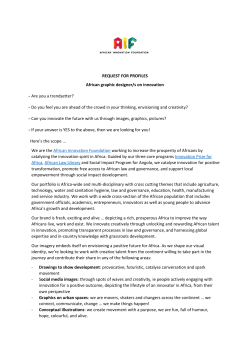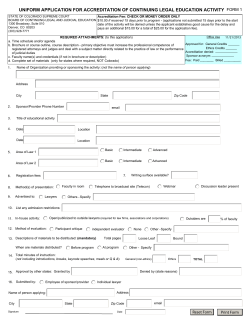
South African Institute of Security Business Plan 2013 - 2014
South African Institute of Security Business Plan 2013 - 2014 Revision No.: 00 South African Institute of Security Business Plan 2013 - 2014 1.0. Introduction The purpose of our Business Plan is to give practical expression to the achievement of the Aim/Vision and Objectives of the South African Institute of Security (SAIS). Central to this Business Plan are a number of Key Performance Areas (KPAs), which are selected by the Institute’s Board of Governors as priority areas of focus for each year. The success of the Board of Governors is largely determined to the extent that the Key Performance Indicators of each KPA are achieved and is an indicator of the commitment of the individual Governors to the profession with we serve. Integral to the Business Plan is the Institute’s Budget, which provides detail about the projected financial resources available for the achievement of our Business Plan. 2.0. Business Plan Drivers The South African Institute of Security’s Aim/Vision and Objectives, as articulated in our Constitution, are the overall drivers for our Business Plan. Our Aim/Vision is to promote individual professional competence and to support the maintenance and enhancement of this competence by security practitioners and aspiring professionals. The Objectives of SAIS are to: “[P]romot[e] security training, education and development within the Private Security Industry and to act as the professional training body of the Security Industry Alliance. Promote, implement, monitor and enforce its Code of Ethics. Encourage and actively promote the advancement of professionalism in the security industry, through effective and appropriate education, training, and development. Improve and enhance the credibility, reputation and ethos of its membership by upholding high standards of professionalism. Use every endeavour to actively promote and improve the standards of security risk management in all fields of human activity. Promote a career structure for the security industry through recognition of appropriate professional security qualifications. Liaise with business, industry, commerce, government departments, public bodies, professions, academic institutions and other associations to promote the furtherance of its objectives. Actively support the publishing of information in furtherance of the activities of the Institute and the security profession. Encourage the development of leaders who will take security to levels of excellence and enhance its reputation and raise the profile of the Institute and the security profession. Document No. BP.2013 Revision No. 00 Date 2013-08-20 Page No. 1 of 5 South African Institute of Security Business Plan 2013 - 2014 [S]upport SASSETA in the programme evaluation of training material for the Private Security Industry. [P]romote within the Private Security Industry security Skills Development. Education and development, and security tertiary education. Inspire trust among the public at large through raising issues with proactive and innovative perspectives that focus on the needs of the public for safety and security. Identify and attract credible serious-minded and independent persons who will give the Institute the opportunity to interact, build, and nurture valuable professional social contacts that will propagate its objectives, formulate solutions and participate in the great debates of the day. Actively support the relevant statutory authorities’ activities to minimise legal noncompliance in the security education, training and development field. The specific Key Performance Areas (KPAs) of our Business Plan flow from our Objectives. These KPAs are determined by specific issues which are relevant, or which will require addressing during the forthcoming year. The theme for this Business Plan is to be “Transformation to Professionalism”. The broad focus area will be to transform the South African Institute of Security along a path to position it as a professional body for the security professional in South Africa. For the period to 30 June 2014, the Board of Governors has identified the following KPAs as areas warranting specific attention (in no particular order of precedence): Corporate Governance – The key focus here is to ensure that the institute is constituted and operated in accordance with the requirements of good corporate governance. This will require an assessment of the extent to which the Board meets the appropriate requirements of the King III Code on Good Corporate Governance (which is applicable to all organisations, including ours), and to develop and implement an action plan to ensure compliance with those areas where it does not comply. Of importance to the Institute are the findings of the Ministerial Committee of Enquiry into the affairs of Cricket South Africa (“CSA”), Chaired by Judge Nicholson. Commonly known as the Nicholson Enquiry, certain key findings were made in respect of governance within organisations. Education, Training and Professional Development – This area is the raison d’être of the Institute, and this year’s focus areas include the establishment and implementation of our Continuing Professional Development Programme (CPDP) and initiating and driving the process, through the Security Industry Alliance (SIA), for the establishment of a Professional Body for the South African security industry. Professional Accreditation – The purpose here is to be in a position to assess the security competence of members and accredit them with the appropriate designation in accordance with the Institute’s Constitution. Membership Development – Healthy membership levels are key to the existence of the Institute, not only to ensure financial stability, but also to promote and support the activities of the Institute. However, a focus also needs to be on the qualitative aspects of membership. Finance – A strong financial position permits to Institute to play its appropriate role of supporting the development of the security profession and industry through its Business Plan. Document No. BP.2013 Revision No. 00 Date 2013-08-20 Page No. 2 of 5 South African Institute of Security Business Plan 2013 - 2014 International Liaison – Benchmarking one’s own processes and activities is important for any organisation to improve. Therefore, SAIS will seek to build mutuallybeneficial relationships internationally with like-minded organisations, for the benefit of our members and potentially of security professionals world-wide. These KPAs are detailed further, by way of Key Performance Indicators (KPIs), in the next section of our Business Plan. Forms of measurement, the allocation of deadlines and responsibilities are attached to each KPI, to ensure that, overall, the Business Plan is properly managed by the Institute’s Board of Governors under the Chairman’s direction. No Business Plan is cast in stone and given that the business environment is dynamic, it is possible that circumstances may result in changes to this Business Plan to better reflect the needs of the Institute and those it represents. 3.0. Key Performance Areas Key Performance Area A: Responsible Corporate Governance Team Leader: Bruce Robertson Objective:To improve the manner in which the Institute, as a professionally-inspired volunteer organisation, approaches the challenges of good corporate governance. Key Performance Indicator A.1 Register the Institute Company (NPC). as a statutory Non-profit Measure Deadline Responsibility Registration Certificate 30 June 2014 Bruce Robertson A.2 Conduct a compliance audit to the requirements of the King III Code for Good Corporate Governance within the SAIS context, and establish and implement an action plan to ensure compliance with the appropriate elements of King III. 1. Corporate Governance Audit 2. Completed Action Plan A.3 Monitor & review the achievement of the Business Plan’s supporting KPAs and KPIs. Minuted Review at Board Meetings 1. 18 October 2013 2. 20 June 2014 Each Board Meeting Bruce Robertson Bruce Robertson Key Performance Area B: Education, Training & Professional Development Team Leader: Gert Pretorius Objective: To actively support education, training and professional development in the security profession and industry. Key Performance Indicator Measure Deadline Responsibility B.1 Establish, and execute a Continuing Professional Development (CPD) Programme for security professionals. Implemented CPDP 20 June 2014 Gert Pretorius 1. 4 September 2013 B.2 Establish and execute a Programme of CPD Activities for members. 1. CPD Activity Programme established. 2. CPD Activity Programme implemented B.3. Play a leading role to assist the Security Industry Alliance (SIA) with the establishment of Professional Body for the South African security industry. 1. Memo. of Intent 2. Registration of Professional Body 1. 18 October 2013 2. 20 June 2014 Document No. BP.2013 Revision No. 00 Date Gert Pretorius 2. 20 June 2014 2013-08-20 Bruce Robertson Mike Verster Page No. 3 of 5 South African Institute of Security Business Plan 2013 - 2014 Key Performance Area C: Professional Accreditation Team Leader: Dave Dodge Objective: Assess the security competence of members and accredit them with the appropriate designation in accordance with the Constitution. Key Performance Indicator Measure Deadline Responsibility C.1. Establish an Accreditation process for new members that takes into account of all available evidence in respect of their skills, knowledge and experience within the security discipline. Process developed (% accreditation based upon Qualifications v. without qualifications) 18 October 2013 Dave Dodge C.2. Establish an automatic review process for accreditation Process developed (% that takes account of changes in the individual’s skills, of upgrades and CPD knowledge and experience and the achievement of the completion) required amount of CPD activities. 18 October 2013 Dave Dodge C.3. Monitor the levels of accreditation across the Analysis of membership, with specific reference to age, gender and membership ethnicity, and formally report to the Board of accreditation with Governors on the achievements in respect of reference to age, transformation. gender and ethnicity 18 October 2013 Dave Dodge Key Performance Area D: Membership Development Team Leader: John Kole Objective: To increase SAIS Membership qualitatively and quantitatively Key Performance Indicator Measure Deadline Responsibility D.1. Develop a membership recruitment pack. Membership Pack – hard copy and electronic versions 4 September 2013 Rosemary Cowan D.2. Maximise membership retention. 95% of begin 2012 membership 18 October 2013. Rosemary Cowan Number of successful D.3. Identify, headhunt and recruit potential high profile recruitments members from ranks of the security profession and (minimum 80%) from industry. agreed “target” list. Target list – 18 October 2013 Review at Board Meeting Graham Wright Number of successful recruitments (10% net improvement on June 2013 membership Review at Board Meetings John Kole D.3. Actively target and recruit present and past “security management” students at SA’s academic and training institutions, with a focus on “previously disadvantaged” students (women inclusive). Key Performance Area E: Finance Team Leader: Peter Jephson Objective: To provide adequate financial resources in support of the Institute's Business Plan. Key Performance Indicator Measure Deadline Responsibility E.1. Establish and manage a budget to support the 20132014 Business Plan. Agreed Budget 1. 4 September 2013 2. Review at Board Meetings Peter Jephson E.2. Identify, plan and execute an annual fundraising plan to support the 2013-2014 Business Plan. Agreed Fundraising Programme 1. 4 September 2013 2. Review at Board Meetings Peter Jephson Document No. BP.2013 Revision No. 00 Date 2013-08-20 Page No. 4 of 5 South African Institute of Security Business Plan 2013 - 2014 Key Performance Area F: International Liaison Team Leader: Errol Peace Objective: To build mutually-beneficial relationships internationally. Key Performance Indicator Measure Deadline F.1. Establish, maintain and strengthen relationships with organisations around the world, which have similar objectives to the Institute, to the mutual benefit of the respective organisations. 1. Develop Cooperation Plan. 2. Agreed MOUs. 1. 4 September 2013 Document No. BP.2013 Revision No. 00 Date Responsibility 2. Review at Board Meetings 2013-08-20 Page No. Errol Peace 5 of 5
© Copyright 2025





















